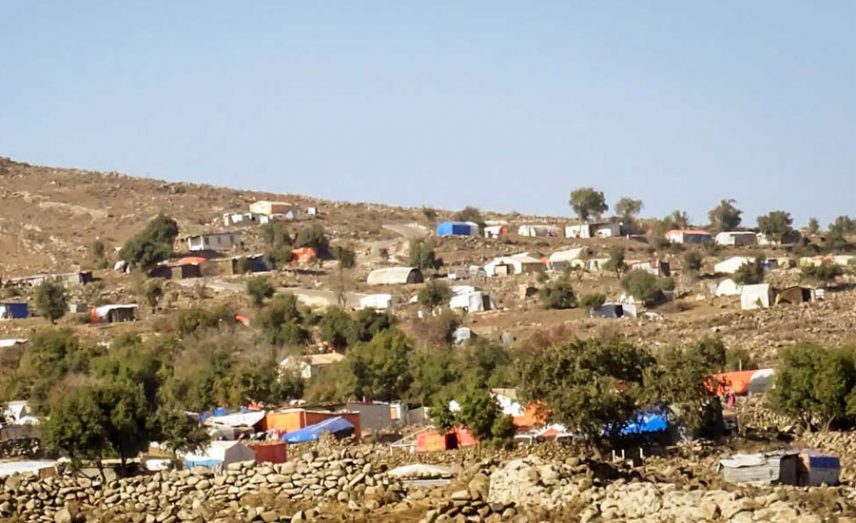The suffering of the people of southern Syria increases with every winter they endure. Everyone here hopes for an end to the war and a return to the warmth of life. The hardships of this cold season are multiplied for the displaced of the camps which are spread throughout parts of the Quneitra and Daraa provinces.
Mohamed Hezaa (Abou Hussein), a camp official in Bariqa and one of those who have fled the assault of the regime forces and the bombardment of its aircraft that has destroyed both humans and stone in his town of Mamtinah, told Ain al-Medina about the suffering endured in the camp which is increasing daily.
“The situation is very tragic…” With those words Abou Hussein beings his interview, describing the bitterness of the life which has befallen them once more in their new home. He said: “The Bariqa camp contains more than 256 families, most of them from the villages of the ‘Triangle of Death’ (Sultana, Deir Makar, Habariyeh, Mamtinah), in addition to about 30 families from the eastern Ghouta. It’s been about two years and 11 months since the camp was set up, interspersed with hunger, disease and cold. This is the third winter for the people of the Bariqa camp, and the situation there is getting worse day after day in light of the fact that there are only a few NGOs and charitable groups, while the trees which surrounded the camp have been cut down and consumed for warmth throughout the last few months. The families here don’t have the ability to buy fuel or any material for warmth because most of those living here don’t have more than the price of a loaf of bread.”
Abou Hussein continues: “We, as men, are strong enough to bear the cold weather, but there are more than 2,000 children and many elderly who are not able to handle the severity of the winter beneath the bits of cloth they are sheltering under. We call on all NGOs and charity groups working in southern Syria to view the situation of the camp residents and secure anything for them that can reduce the cold of this season.”
It is the same situation in the Al-Amal camp in the Quneitra province. Tents are facing the winds of the storm and harbor people displaced by the war who live with the hope of return. Umm Khalid, who was displaced from her home in the Hamriyah village, lives with her children in one of the tents. She described her situation to Ain al-Medina: “I feel extremely sad when I see my children suffering from the severe cold. But I can’t do anything for them. When the sun rises, we go, my children and I, to the garbage dumps, and search for some plastic scraps to burn at night and protect ourselves with its heat from this cold. We are waiting for relief and to return quickly to our town and our home.”
In the Tel al-Simin camp, in the northwest of Daraa province, about 300 families (around 1,800 people) are living in an arid agricultural region. The facility is experiencing severe lack of medical supplies, while most of the children go without access to school — and then the winter comes upon them, more severe than any previous time. “This camp has gotten old and worn out and can’t resist the cold and the rain, which has caused many illnesses, especially among children and elderly. In addition, all the roads and paths are extremely muddy and it’s hard to walk along them. Some NGOs have offered an amount of bagasse (remnants of olives) for the heaters. Three bags are given to each tent, but it is not enough,” Ahmed al-Fadali, one of the Tel al-Simin camp residents, tells Ain al-Medina.
In light of this suffering, the role of the NGOs and charities in helping these camps is important. Abou Ahmed al-Masry, director of the “Elaaf Association,” a group which distributes bagasse to camp residents, told Ain al-Media: “We are making concerted efforts with the approach of winter to reduce the suffering of displaced people regarding the severe cold. We have distributed bagasse to many villages and camps, in addition to distributing winter clothes for children to more than 200 poor families, as part of the association’s active efforts and continuing humanitarian support.”
The Daraa and Quneitra provinces include a number of camps, most of them spread along the border with the occupied Golan Heights and Jordan. Most of the people suffer from severe poverty, and the cold and brutal winter days pass heavily on their hearts and weak bodies, made weary by the war.
This article was translated and edited by The Syrian Observer. Responsibility for the information and views set out in this article lies entirely with the author.


